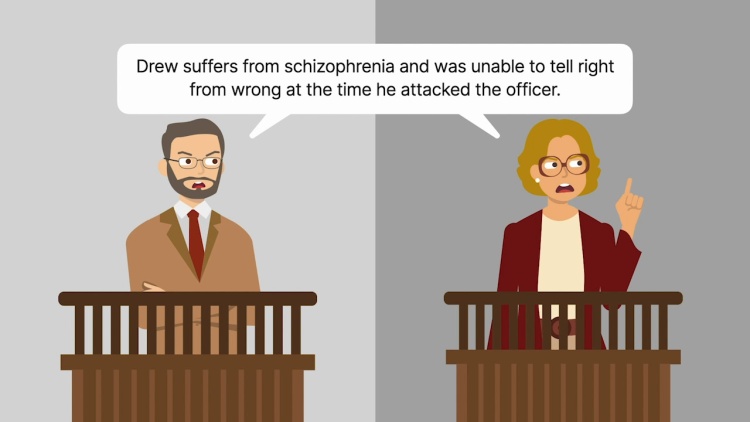People v. Drew
California Supreme Court
22 Cal. 3d 333, 583 P.2d 1318 (1978)

- Written by Josh Lee, JD
Facts
While frequenting a bar, Ronald Drew (defendant) confronted another patron, accusing him of stealing money. When police officers tried to escort Drew outside, Drew struck one of the officers, causing the officer to hit his head on the bar. Drew was charged with various offenses, including battery. Drew argued, among other things, that he was not guilty by reason of insanity. At the liability phase of trial, the jury concluded that Drew did commit a battery. The trial then turned to whether Drew was nevertheless not guilty by reason of insanity. Two psychiatrists testified that they believed Drew suffered from latent schizophrenia and that when in a schizophrenic state, Drew was likely unable to tell right from wrong. Relying on the M’Naghten rule, the trial court instructed the jury that insanity was a defense only if Drew lacked the mental capacity to understand the nature of his actions or their wrongfulness. The jury concluded that Drew was not legally insane, and Drew was sentenced to prison. Drew appealed.
Rule of Law
Issue
Holding and Reasoning (Tobriner, J.)
Dissent (Richardson, J.)
Dissent (Clark, J.)
What to do next…
Here's why 907,000 law students have relied on our case briefs:
- Written by law professors and practitioners, not other law students. 47,100 briefs, keyed to 996 casebooks. Top-notch customer support.
- The right amount of information, includes the facts, issues, rule of law, holding and reasoning, and any concurrences and dissents.
- Access in your classes, works on your mobile and tablet. Massive library of related video lessons and high quality multiple-choice questions.
- Easy to use, uniform format for every case brief. Written in plain English, not in legalese. Our briefs summarize and simplify; they don’t just repeat the court’s language.





